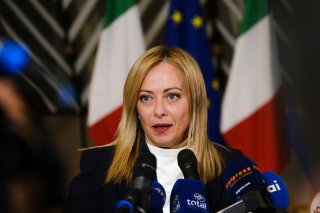The United States, Italy, and Winning the Med
Washington and Rome will have to be the strategic leaders in this critical region.
Russia’s brutal invasion of Ukraine is grabbing all the attention. But we need to look South, too. Neither the European Union nor NATO will be the strategic leaders in the Greater Mediterranean. Washington and Rome will have to play that role.
A stable, prosperous, peaceful Europe would be a boon to the entire transatlantic community. A free and open Greater Mediterranean is key to that goal.
One reason is energy security. The Greater Mediterranean includes North Africa, Southern Europe, the Balkans, the Black Sea, and the entrance into the Middle Corridor through the Caucasus to Central Asia. As Europe diversifies energy sources, countries will draw increasingly from North Africa, the Caucuses, and Central Asia, as well as the Middle East and the United States. A lot of those resources will flow to energy hubs in Southern Europe, and those nodes need to be protected.
Another reason is supply chains. Redundant, resilient supply chains that reduce dependencies on Russia and China and open new sources of natural resources will, in the long run, reduce risks and costs to the West. They will also spur additional commercial activity. These new supply chains, too, will pass through Southern Europe.
Stability is another issue—one threatened by illegal immigration. The population of Africa is blowing out. Uncontrolled, unregulated mass migration North would be completely destabilizing. Southern Europe needs to be a bridge and a partner for the Global South, not a gateway for chaos.
Finally, the Greater Mediterranean will be an active arena in the great power competition—whether the West wants it or not. To counterbalance its difficulties in Ukraine, Moscow is trying to strengthen its influence in Africa, thus putting pressure on NATO’s southern flank. A close partnership between Washington and Rome in the Mediterranean basin could effectively counter this strategy, promoting the stabilization of North Africa. Meanwhile, China is always looking to fill voids. Right now, for instance, they are making a full-court press in Tunisia.
Why should Rome and Washington step in? They have common interests in addressing these problems. And, let’s face it, NATO’s top priority is going to be the eastern flank. The EU has no common foreign policy looking south, and little capacity to do much more than throwing ineffective foreign aid in all directions. Meanwhile, German leadership is moribund, and France’s has been demonstrably inept.
Italian prime minister Giorgia Meloni is ready to pick up the slack. The main objective of her foreign policy is to relaunch Italy’s role in NATO and in the Mediterranean basin. She understands the strategic importance of the southern flank in countering China’s inroads and Russia’s persistent influence in North Africa and the Sahel region. In January, Meloni made two trips to North Africa, focusing on increasing energy supplies and tackling the problem of illegal immigration. Rome is trying to reduce the import of Russian gas and forestall Moscow’s potential weaponization of African migration flows.
As such, when it comes to the Mediterranean basin, Italian foreign policy is gradually aligning itself with Washington. For instance, Meloni went to Tripoli, Libya, a few weeks after the director of the CIA met with Libyan prime minister Abdul Hamid Dbeibeh and Gen. Khalifa Haftar. During her recent visit, the Italian prime minister declared her support for the political stabilization of the North African country, a position expressed, just a few days later, also by the U.S. Secretary of State during a meeting in Cairo with the Egyptian president Abdel Fattah el-Sisi.
While focusing its attention on the Mediterranean basin and on the Middle East, Italy’s conservative government is, at the same time, relaunching transatlantic relations and confirming its support for Kiev: after all, the challenges that both the eastern and southern flanks of NATO are facing are closely interconnected.
What the United States brings to the table is presence. For instance, the United States has been granted additional access to military facilities in Greece and Romania, allowing Washington to deploy reconnaissance aircraft, missile defenses, and other security enablers that make its southern European allies far more effective. This is a much smaller and more cost-effective footprint than what the United States deployed during the Cold War to deter the Soviet Union.
Additionally, the United States can bring in foreign direct investment, mostly from the private sector, that can speed “friend-shoring.” This will help the region decrease its dependence on China and Russia while helping grow economies in Europe. Finally, the United States can bring diplomatic heft, sorting through the myriad of thorny relationship challenges in the region.
Of course, the EU and NATO will always have a role to play in southern Europe. But a bilateral effort from Washington and Rome can be the catalyst for greater stability and prosperity throughout the Greater Mediterranean.
Stefano Graziosi is an essayist and a political analyst who writes for the Italian newspaper La Verità and the weekly magazine Panorama.
A Heritage Foundation vice president, James Jay Carafano directs the think tank’s research on matters of national security and foreign relations.
Image: Alexandros Michailidis/Shutterstock.

